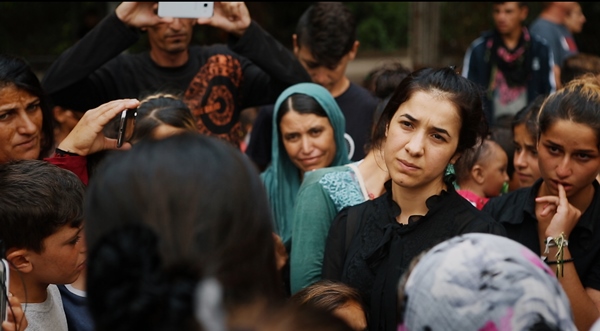![]() This powerful documentary starts out with news reports concerning the Yazidis, a non-Muslim ethnic minority in the Middle East, which has been persecuted throughout much of their history. In August of 2014, ISIS fighters invaded a village in northern Iraq, at which point they segregated the population, executed all of the men, and forced the women into sexual slavery. Future human rights activist Nadia Murad was among those women, and within months of escaping from her captors, she spoke out publicly about the horrors she witnessed and endured.
This powerful documentary starts out with news reports concerning the Yazidis, a non-Muslim ethnic minority in the Middle East, which has been persecuted throughout much of their history. In August of 2014, ISIS fighters invaded a village in northern Iraq, at which point they segregated the population, executed all of the men, and forced the women into sexual slavery. Future human rights activist Nadia Murad was among those women, and within months of escaping from her captors, she spoke out publicly about the horrors she witnessed and endured.
In December of 2015, the United Nations Security Council invited Murad to testify on human trafficking. We see her writing her testimony on a legal pad, but that hardly prepares us for the actual event, in which the words become somehow less important than the sight of her speaking them. While revisiting the past is clearly difficult for her, Murad’s steely determination shines through. After this galvanizing opener, director Alexandria Bombach follows her over the next several months as she gets ready to testify again, albeit to the full UN General Assembly this time.
But until then, Murad travels the world, telling her story to government officials as well as local media outlets and continuously questioning why those who committed what amounts to an act of ethnic cleansing have not been brought to justice. She never fails to provoke reactions among journalists and politicians, who often break down into tears. Yet Bombach always remains laser-focused on Murad, who can seem stony on the surface, although brief cutaways reveal that beneath her appearance she is also nervous—small actions such as fidgeting with her hands are giveaways.
The film takes an intimate approach to its subject, who occasionally speaks directly to the camera. These moments can be revelatory. While recovering in Germany, which took her in as a refugee, she remembers that other Yazidi girls and women are still living in the hellish situation she just escaped from. That is what spurred her into action in the first place.
The central narrative involves Murad trying to convince world leaders to put her ISIS tormentors on trial. However, she also undergoes a personal transformation from shell-shocked survivor into a beacon of hope. We can see the difference in Murad between her earliest appearances, when she is visiting Canada’s Parliament Hill and still seems in a daze, and later on, when she is among Yazidis refugees holding a public protest in Greece, where they have formed a community. Her fellow survivors wail in agony and throw their bodies onto the ground, seeking a solace that Murad provides through her words.
Unlike the scenes between Murad and certain politicians, which come across as surreal and disconnected, the rallies she takes part in have an intense, immediate quality. At this point, she is well-known enough that there is no shortage of media on-hand, as well as passersby snapping photographs, although the question is whether any of this attention will successfully wake up the world.
Throughout, Bombach treats her subject with sensitivity and respect. Whenever Murad starts talking about the details of her captivity, the director either fades her voice out or cuts to the end of her story, a creative decision that keeps On Her Shoulders from ever seeming overly gratuitous. Often, these scenes also feature Murad standing stoically in the distance, as if simulating the kind of emotional distancing she must engage in to revisit the dark places in her memory over and over again.
But her journey is not completely devoid of light and humanity, as she forms a surrogate family with other activists, most notably the director of a Yazidi aid organization, Murad Ismael, who steadfastly supports her. The only person here whose role is possibly deserving of an asterisk beside her name is human rights lawyer Amal Clooney, the spouse of movie star George Clooney, whom the film depicts as a rarer presence than the mass media has implied, and a distraction at times.
Much of the suspense has to do with whether Murad will have her testimony fine-tuned in time for the UN General Assembly meeting, although there are also concerns among her friends that even if ISIS is ultimately driven away from her former hometown, there is nothing left to go back to. This conversation foreshadows a potentially heartbreaking epilogue. Yet that does not change the fact that this portrait of a remarkable activist is vibrant and inspiring, and among the best films of this year.

















Leave A Comment